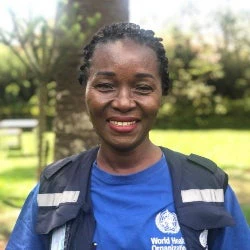Julienne N. Anoko, is a social-anthropologist (PhD) from the Sorbonne University in France. She completed her academic preparation in the area of epidemiology & public health, and gender & health performing masters’ degrees. For greater than 16 years she has been supporting several institutions (public administrations, NGOs, international development and United Nations Organizations) in addressing social norms, communication for development and gender issues both during emergency outbreaks and into development programs for better efficiency and accountability.
Between 2005 and 2014, Dr. Anoko supported the World Health Organization and UNICEF during the Ebola and Marburg outbreaks, as well as the H1N1 influenza pandemic in both developed and developing countries in Africa, America and Europe.
In 2015, she joined the United Nations Mission for Ebola Emergency Response (UNMEER) in Guinea to coordinate, support and leverage the Social Mobilization and Community Engagement pillar in order to implement interventions compatible with sociocultural contexts to gain community trust and participation into the overall response.
Between 2015 and 2016, she was appointed as in-house social-anthropologist of UNICEF in the Guinea country Office to support the mainstreaming of social norms into both the Ebola emergency response and development programs.
She is actually supporting UNICEF West and Central Africa Regional Office of in strengthening social norms programming into regional priorities (2016-2021)
norms programming into regional priorities (2016-2021) Dr. Anoko has published books and papers, and contributed in developing several guidelines for United Nations agencies dealing with her areas of expertise. Dr. Anoko had been featured in articles from National Public Radio (USA), National Geographic, The Washington Post, WHO, and others.
She is recipient of the “Research and Innovation 2015 Award” for her engagement in the field during the West African Ebola epidemic, from the French Red Cross Humanitarian Fund.

